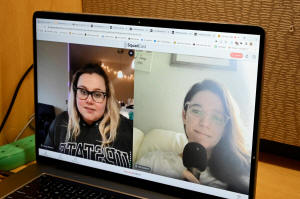Young adults with disabilities find community on social media
 Send a link to a friend
Send a link to a friend
 [August 24, 2022]
By Sheila Dang [August 24, 2022]
By Sheila Dang
(Reuters) - Frustrated by what they felt
were misperceptions of people with disabilities, Logan Kelble began
posting dance videos on TikTok and bold, colorful fashion and makeup
looks on Instagram – often with their feeding tube on full display.
Kelble, a 22-year-old living in West Virginia who uses they/them
pronouns, said sharing glimpses of their life with a feeding tube and
Ehlers-Danlos syndrome (EDS), a rare disorder that affects connective
tissue and causes chronic pain for Kelble, has been a way to show the
world that people with illnesses or disabilities are not defined by
their conditions.
"I started the accounts just honestly to make friends, because I didn't
know anybody who had what I had," they said. "People often will treat me
differently or feel sorry for me, or almost pity me because I have a
feeding tube. Disabled people are not physically the same, but mentally,
we are just as capable of being complex and intelligent people."
Kelble and Nicole Spencer, a medical student who also lives with EDS,
are among a number of young people using social media to fight
misperceptions of disabilities and talk frankly about their mental and
physical health.

Their use of social media is especially poignant at a time when social
media companies are reckoning with backlash from lawmakers, health
experts and even their own users, who say apps like Instagram and TikTok
encourage people to post glossy highlights of their lives, leading to
lower self-esteem among young users.
For example, Facebook, which has since renamed itself Meta Platforms,
was the center of controversy last year when whistleblower Frances
Haugen leaked documents that she said showed Facebook knew Instagram was
harming some teens' self-image, but failed to address the problem. The
company said in response that the documents were used to paint a "false
picture."
The key for users is to avoid mindlessly scrolling social media feeds
and passively consuming content, said Jacqueline Sperling, a clinical
psychologist and co-founder of the McLean Anxiety Mastery Program at
McLean Hospital in Cambridge, Massachusetts.
"When you're scrolling through the news feed or other people's posts,
that creates an opportunity for comparison when you may notice someone
else has more 'likes,'" she said.
Social media can be rewarding when used to facilitate real connections,
like making plans to meet and spend time together, Sperling said.
Translating online scrolling into real-world impact has come naturally
to Spencer, a 24-year-old medical student at SUNY Upstate Medical
University, who was diagnosed with EDS and postural orthostatic
tachycardia syndrome (POTS), which affects blood flow and leads to low
energy.
Spencer has packed and shipped more than 400 personalized care packages
to kids and young adults with chronic illnesses through an Instagram
page she oversees called Potsie Packs, funded by donations.
[to top of second column]
|

Nicole Spencer, 24, a medical student
who suffers from Postural Orthostatic Tachycardia Syndrome (POTS),
is interviewed by Haley Carey, 24, about her medical condition, at
her apartment in Syracuse, New York, U.S. May 4, 2022. Carey also
has POTS and met Spencer through social media. Both share their
symptoms daily and support each other. REUTERS/Magali Druscovich
 Typical items in the care packages
might include electrolyte drink mixes or compression socks. But they
also include fun items like stickers or tube tape with colorful
patterns, which can be used to tape feeding tubes in place.
Spencer said recipients have told her the packages have helped them
feel accepted and that they're "part of this community now."
Still, the darker side of social media has at times reared its head.
Strangers on TikTok and Reddit have criticized Kelble's appearance
or accused them of fabricating their illness and using fake stick-on
tubes.
"It's absurd," Kelble said. "I just block them and move on."
A Reuters reporter reviewed medical records and spoke with doctors
for Spencer and Kelble who confirmed their conditions. A Reuters
photographer accompanied them to doctor appointments and documented
their daily routines of prepping multiple medications at home and
filming videos for social media.
With chronic conditions that make it difficult to travel or leave
the house for long periods of time, the apps have helped both Kelble
and Spencer form friendships with people in different corners of the
country.
What began as direct messages on Instagram eventually became
near-daily FaceTime calls between Kelble and three friends. Forming
a connection with the friends, all of whom also live with a chronic
illness or disability, has helped Kelble move past difficult times.
"They genuinely saved my life several times," said Kelble.

Some followers have also helped support Kelble by purchasing items
through an Amazon wish list or sending donations.
After several life-changing experiences, which she said included
losing her childhood best friend to cancer and then living with her
own chronic illness, Spencer's plan after medical school is to
become a pediatrician and work with children and teens as a doctor
who can relate to them.
"Through all of the experiences that I've had, through being sick
myself or seeing my friends go through much more challenging
illnesses... if I could make one kid feel a little less alone, that
would be my dream," she said.
(Reporting by Sheila Dang in Dallas; editing by Diane Craft)
[© 2022 Thomson Reuters. All rights
reserved.] This material may not be published,
broadcast, rewritten or redistributed.
Thompson Reuters is solely responsible for this content. |